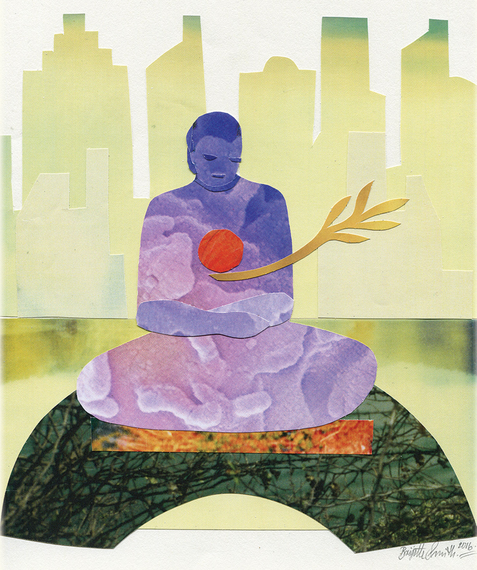Meditation is a process to create a meditative state within us that manifests our heart's intrinsic goodness. This expression of goodness makes peace dynamic and life-affirming, and in its wake, brings unity and harmony to this world.
WHY DO WE MEDITATE?
Often people ask out of curiosity, "Why do you meditate?"
I may answer, "To regulate the mind."
"Why do you need to regulate the mind?"
"To attain a state of peace."
"But what will you do with a regulated mind, with the stillness and calmness that exists within you when you meditate?"
This is a wise and stimulating line of inquiry.
What can we do with that meditative experience that helps us to rise above fickle tempers and ascend the pedestal of a steady and unruffled peace?
A lot is possible.
When peace prevails within us, and our hearts are serene and content, can we fight with one another? When we are in a calm state and we interact with family and community members, co-workers and strangers, are we not more considerate of their worries, their troubles and also kinder in our response? When we read a book in a tranquil state, will we not understand its message better?
FROM MEDITATION TO MEDITATIVE STATE
Meditation, understood properly, is a process to create a meditative state. Once this meditative state is achieved, where there is serenity, calmness and peace, we are able to manifest the intrinsic goodness of our heart. This expression of our heart's goodness makes peace more dynamic and life-affirming, and, in its wake, brings unity and harmony to this world.
A peaceful and meditative heart easily distinguishes what is good for all, detects the cause behind an action and its effect, and screens our future actions by adjusting our erratic tendencies.
But when we don't attempt to manifest our heart's intrinsic goodness, even meditation itself can become a bondage and weigh down the expansion of our consciousness. I believe this happens because when we experience a profound contact with the quiet inner life during meditation, we want that experience repeated, intensified and to last longer the next time we meditate.
Caught up in liking and disliking experiences, we form a bondage that limits our consciousness. In fact, in order to expand our consciousness, what we do with our experience in meditation matters as much as observing and learning from our experience.
If we meditate, feel peaceful and simply stop at that, it is, to say the least, a self-centered pastime. The aim is to go beyond a day of peace for ourselves - and others! All the same, how can we step beyond the everyday, every-minute fears, prejudices and ego outbursts that numb our heart's goodness?
WHAT EVOLVES WHEN WE MEDITATE?
The laws of morphological evolution do not generally permit the physical body to evolve quickly. So what is evolving when we expand our consciousness through meditation?
It is the mind, intellect and ego, which have their existence in consciousness. Consciousness is like a canvas to a painter and on this canvas the play of the mind, intellect and ego is orchestrated daily.
Over time, a fervent, joyful practice of meditation regulates the mind, so that it goes from a restless, turbulent state to stillness and one-pointed attention. The intellect becomes more heart-based, guided by the heart's intrinsic goodness.
Ego is often seen as the bad guy in almost all traditions, but it's an essential element of an active mind. It's responsible for the doing, thinking function, and we need it in every aspect of daily life. Ego gives us our identity but, like gravity, can also keep us overly self-centred. As a result of meditation, the ego is refined so that the heart is able to expand into a generous and altruistic state.
Indeed, it would be wonderful to display the efficacy brought about by this meditation practice. What is the result? An evolved state of consciousness where the expression of the heart's goodness is automatic and global peace is the natural choice.
The knowledge of peace thus acquired by direct experience in meditation allows neither doubt nor contradiction to how precious peace is for human potential to flourish.
On the contrary, knowledge of peace without inner experience puts up a well-intentioned but anemic defence in the face of chronic tribulations, and then the worthy goal of peace among nations aborts.
Heartfulness meditation is fully geared towards the evolution of consciousness to the highest level, within the demands of daily life. And this is achieved with a short heart-based meditation in the morning, aided by transmission; a shorter unwinding in the evening to remove daily stress, known as cleaning; and prior to bedtime, a prayerful entreaty that allows you to heed the heart's wise and unceasing guidance.
In the end, here is something to think about more deeply: Will I be at peace when I know my family is not at ease? Will I be at peace when my city is safe but my neighboring town is afflicted with some deadly disease?
World peace is possible only when all are at peace. Individual peace precedes the group dynamics. Per contra, what if the whole world is at peace and I am not! One individual at a time...
Please join us for meditation on the 21st September, International Day of Peace, and the following days. For more information and to participate visit:
http://ipd.heartfulness.org
